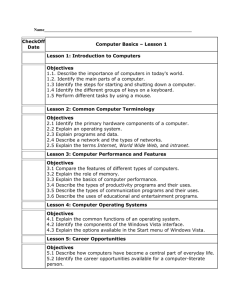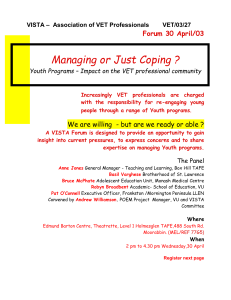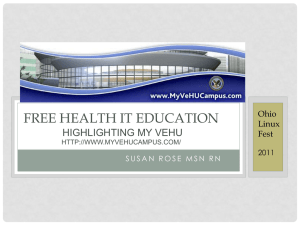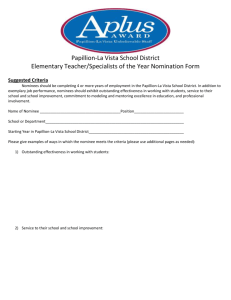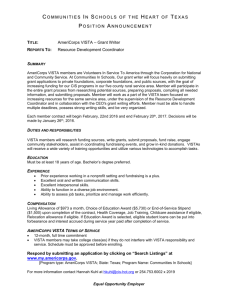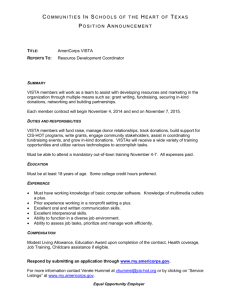SOCI 3310_End-Berg - Kennesaw State University
advertisement
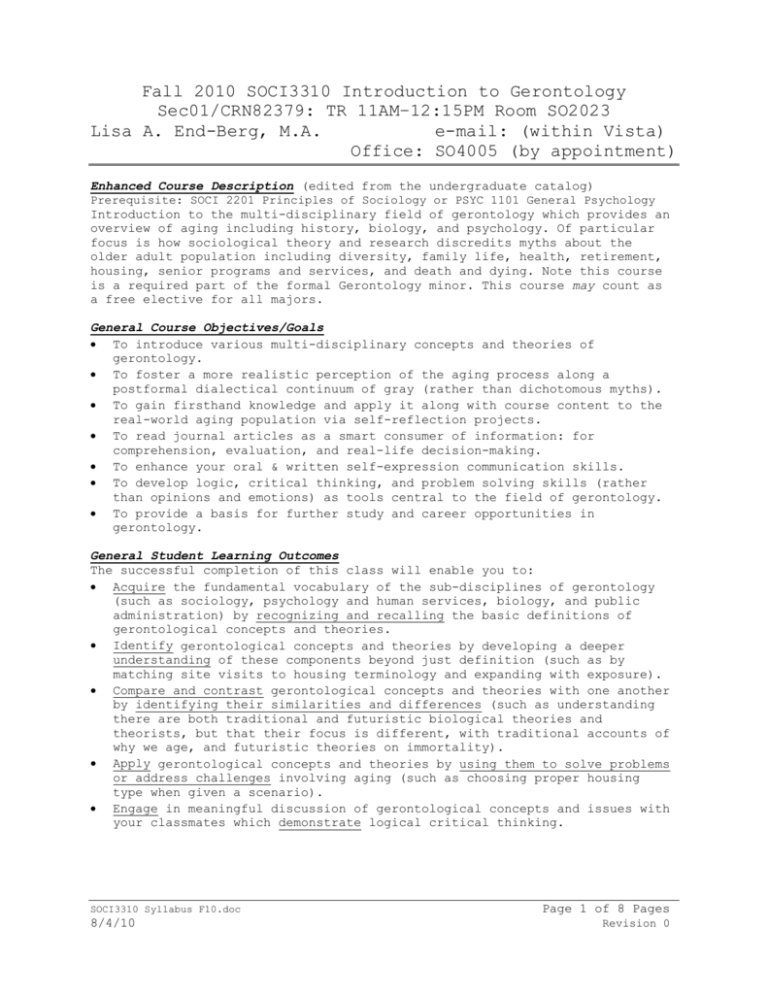
Fall 2010 SOCI3310 Introduction to Gerontology Sec01/CRN82379: TR 11AM–12:15PM Room SO2023 Lisa A. End-Berg, M.A. e-mail: (within Vista) Office: SO4005 (by appointment) Enhanced Course Description (edited from the undergraduate catalog) Prerequisite: SOCI 2201 Principles of Sociology or PSYC 1101 General Psychology Introduction to the multi-disciplinary field of gerontology which provides an overview of aging including history, biology, and psychology. Of particular focus is how sociological theory and research discredits myths about the older adult population including diversity, family life, health, retirement, housing, senior programs and services, and death and dying. Note this course is a required part of the formal Gerontology minor. This course may count as a free elective for all majors. General Course Objectives/Goals • To introduce various multi-disciplinary concepts and theories of gerontology. • To foster a more realistic perception of the aging process along a postformal dialectical continuum of gray (rather than dichotomous myths). • To gain firsthand knowledge and apply it along with course content to the real-world aging population via self-reflection projects. • To read journal articles as a smart consumer of information: for comprehension, evaluation, and real-life decision-making. • To enhance your oral & written self-expression communication skills. • To develop logic, critical thinking, and problem solving skills (rather than opinions and emotions) as tools central to the field of gerontology. • To provide a basis for further study and career opportunities in gerontology. General Student Learning Outcomes The successful completion of this class will enable you to: • Acquire the fundamental vocabulary of the sub-disciplines of gerontology (such as sociology, psychology and human services, biology, and public administration) by recognizing and recalling the basic definitions of gerontological concepts and theories. • Identify gerontological concepts and theories by developing a deeper understanding of these components beyond just definition (such as by matching site visits to housing terminology and expanding with exposure). • Compare and contrast gerontological concepts and theories with one another by identifying their similarities and differences (such as understanding there are both traditional and futuristic biological theories and theorists, but that their focus is different, with traditional accounts of why we age, and futuristic theories on immortality). • Apply gerontological concepts and theories by using them to solve problems or address challenges involving aging (such as choosing proper housing type when given a scenario). • Engage in meaningful discussion of gerontological concepts and issues with your classmates which demonstrate logical critical thinking. SOCI3310 Syllabus F10.doc 8/4/10 Page 1 of 8 Pages Revision 0 Required Course Materials 1. Quadagno, Jill. (2011). Aging & the Life Course: An Introduction to Social Gerontology (5th ed.). New York: McGraw Hill. ISBN-13 9780073528229. ≈$145. (Alternately, 6-month eBook access is ≈$54 and can be purchased directly through the publisher at http://www.coursesmart.com/0077315359?__instructor=1180951). 2. Material outlines and activities are available on Vista so that you can print before class to take good side notes as we cover the material during lectures, videos, and activities. 3. Links to required website and journal readings are also followed from within Vista. Optional Study Materials 4. You may also access the textbook’s resource website via Vista at highered.mcgraw-hill.com/sites/0073528226/student_view0/index.html for additional materials. Warning: This course may be challenging if you are not interested in multidisciplinary aging. There is a lot of complex material to cover in a brief time period. You must be a strong self-directed learner with time management skills to remain current in readings and projects. The lectures expound upon the reading, as well as provide video and verbal examples. As with most college courses, students should schedule 3 times the weekly in course credit time for readings, assignments, and studying. By giving yourself ≈7½-9 hours each week throughout the semester for this course, you should be on track for success. E-Mail & Contacting the Instructor You are required to utilize your Vista account and check it regularly for periodic communications. Vista e-mail is also the best way to personally communicate with me. If you have a general question that is not private, please post it to the “Ask Teacher Lisa” Discussion Board as other students may have the same question and may benefit from the answer. Contacting Your Classmates If you would like to communicate with your classmates, please use the "Student Cyber Cafe" Discussion Board (set up for this purpose on the homepage). Remember, these messages are not private! Although virtual communication may be less threatening, be cautious not to share inappropriate personal details. Although not a graded area of the course, professionalism, academic integrity, netiquette, and all course policies and procedures are in effect. Discussions will be monitored, and the Instructor reserves the right to delete problematic postings and/or prevent an individual student from posting again. Grade-Earning Assignments 66% 3 Open Book/Note Vista Exams (22% each) 24% Successful Aging Literacy Projects (Health 2%; Field Trips 5%; Retirement 10%; Death 7%) 10% Attendance (.4% each session with signed attendance sheet) Grading Criteria A = 90 – 100 = Excellent; Far Exceeds Expectations B = 80 – 89 = Good; Exceeds Expectations C = 70 - 79 = Satisfactory; Meets Minimum Requirements D = 60 - 69 = Passing; Work Less Than Satisfactory F = 59 – 0 = Failing; Unsatisfactory Work SOCI3310 Syllabus F10.doc 8/4/10 Data (10 Terms/Sections) (X=85; N=291) (rounded) 80, or 27% 123, or 42% 66, or 23% 10, or 3% 12, or 4% (missed work) Page 2 of 8 Pages Revision 0 Electronics Policy: No Laptops, Recording Devices, or Cell Phones Neither laptops nor audio or video playing/recording devices may be used in class without learning disability documentation (see Special Needs Statement on Vista) and my prior approval. Cell phones are prohibited in class; turn them off. If you have an emergency, please let me know before class begins. You will be required to set your phone to vibrate. You must leave the room to attend to the matter. Socializing, phone ringing, listening to music and/or texting/keystroking in class is distracting to me as well as to your fellow classmates. For each disturbance you cause, you will be asked to leave class and will also lose 10 points (that’s one letter grade) off your final course grade. Open-Book/Note Vista Exams Exams mainly consist of multiple choice, mixed with a few true/false and/or matching. The first exam will cover material to that date. Subsequent exams will cover material since the last exam. While exams are not cumulative, as the knowledge gained from the course builds, some questions may require students to incorporate concepts learned throughout the semester. While challenging, to meet course objectives, understanding concepts and their real world application is more useful than memorizing and regurgitating data. You will be expected to compare and contrast different theories, theorists, and perspectives from each other, as well as connect their basic principles to research. Therefore, exams are largely applied scenarios which require critical thinking skills. To do well, you have to organize your notes in advance so you can access the information you need to apply in a timely manner, a skill for most jobs. Be a strong self-directed learner; pace yourself, stay current in readings and assignments. Trying to read and prepare for an exam or do an entire assignment the night before is likely to prove impossible. You are responsible for all course/text material, although exam questions will not necessarily be asked of all topics. As a minimum starting point, review the module learning objectives, study key vocabulary/concepts and PowerPoint presentations, as be sure to look over any notes you’ve taken on discussions, videos, and activities. Study guides are available on Vista now so that you may review and address any questions you have about material and/or any exam. Tip: To succeed in the course, prepare the study aids that work for you as you progress toward the exams. This method helps you to gradually master the definitional material, while at the same time preparing for applying what you have learned. Assignment Due Date Policy for Exams/Research Quizzes and Projects Exams and Retirement & Death quizzes must be completed on Vista. Do not miss the expiration as no changes will be granted, and you will score a zero. Biology/Health & Field Trip Projects must be turned in class at the beginning as noted on the schedule. Do not FAX me, leave your assignment under any door, or in any wall pocket outside an office. If you are aware before any due date that you will be unable to attend for an excusable and documentable reason, please see me in advance for approval. To earn credit in permissible situations, you will generally take it to the main Psychology office, SO4030, sign the time/date sheet, and request the Secretary put it in my mailbox. After the due date, with documentation of an extreme emergency causing your unplanned ability to meet a deadline (such as an accident report or emergency room receipt copy), I will individually consider extending 70% partial credit for completing the assignment within a week. No further partial credit options exist, and there are no dropped grades. SOCI3310 Syllabus F10.doc 8/4/10 Page 3 of 8 Pages Revision 0 Successful Aging Literacy Projects (collected at the beginning of class) 1. Biology/Health (individual project) • Complete the longevity tests online at LivingTo100.com and RealAge.com. Print out the full results for class discussion. Write your name at the top of the first page of each, which shows your age. For grading, you will only turn in these 2 pages. 2. Field Trips (individual project followed by individual Vista quiz) • Visit 2 separate sites for about an hour each. Call in advance to set an appointment for your tour. 1. Visit an active site (senior center, independent living facility, or 55+ housing community). 2. Visit a less active site (adult daycare, assisted living, CCRC, nursing home, or hospice). • In Vista, for each site visited, name and define the type of facility, indicate your reaction, and decide whether you would use or refer a loved one to the facility (or not) in your later years and why. As applicable, consider floorplans, pricing, assistance, and activities offered. • You must turn in the business card of those you visited in order to record a grade. Simply write your name, date, time, and duration of visit on the back and turn in at class per the schedule. 3. Retirement Planning (research followed by individual Vista quiz) • Research lifespan saving, investing, and wealth-building techniques. Then, demonstrate your knowledge by answering comprehensive whole number budgetrelated questions. Before attempting the Vista scenario, you should be able to: o Calculate investment deductions and balances when given age, income, percentage, and company match, and also project retirement draw. o Calculate a PITI payment on given home purchase price, downpayment, and interest rate. o Calculate a PI payment when given car purchase price, downpayment, and interest rate. o Identify and calculate typical deductions taken from pre-tax/gross earnings and the resultant post-tax/net income. o Estimate life and long-term care insurance premiums when given age and coverage limits. o Project Social Security income and Medicare expenses when given age and income. 4. Death & Dying: Estate Planning (research following by individual Vista quiz) • Complete the Medical Directives Activity. If you do not want the document to possibly be used in an emergency, please sign your name as Exercise Only and then shred when returned. • Before attempting the will and codicil Vista quiz, you should: o Know the difference between the legal terms devise and bequeath used in a will. o Know the difference between executor and executrix, when appointing a Guardian is necessary, and what happens when there is no will. o Be able to identify where life insurance and retirement plan beneficiaries are named. o Be able to estimate final services costs for cremation or preparation, including casket or urn, wood or metal, cemetery lot and memorial. SOCI3310 Syllabus F10.doc 8/4/10 Page 4 of 8 Pages Revision 0 • • • • Routinely use your NetID and password to Log In to the course Vista site at kennesaw8.view.usg.edu for material outlines, activities, and exams/quizzes. o Once logged in, click on SOCI3310. You’re in! Many of these files are in .PDF format, requiring the Adobe Acrobat Reader on your home machine. Also, depending on file type and computer set-up, you may also need Windows MediaPlayer, RealPlayer, and/or QuickTime. If you do not have these programs, you will need to use the campus computers or download what you need for free from get.adobe.com/reader/, www.microsoft.com/windows/windowsmedia/player/10/default.aspx, www.real.com, and/or www.apple.com/quicktime/download, respectively. It is your responsibility to pace and complete your work on schedule. Sometimes circumstances beyond our control (such as upgrades, software and/or hardware failure, and/or computer incompatibility) prevent us from using Vista. Please note that computer/technical problems and/or waiting too late such as until the day before assignments are due DO NOT EXCUSE YOU from completing course assignments on time. You know the course schedule for graded items now, each is available for an extended period of time, and you have enough notice to make sure your work is completed. It is best to work early in case you have to try again later before the deadline. ALL VISTA PROBLEMS should first be brought to my attention for resolution before contacting Campus Service at 770-423-3555 or visiting the Student Lab BB475. NetID Your NetID may consist of your three initials in lowercase followed by four random numbers, or your first initial and last name, or your first initial and last name and random numbers. Setup your NetID account at netid.kennesaw.edu/ if necessary. NOTE: If you have any problems with access at home, use the computers on campus. If you have problems logging on such as incorrect username or password, go to the Forgot Password area of netid.kennesaw.edu/ to reset your password by answering the security question you created when you setup your account. If this does not yield information that you can then use to sign on, you’ll need to have the password and NetID reset and then you’ll have to reactivate. Vista Printing Click on the desired topic heading. Click on what you want to print. Print .pdf files using the print icon within the Adobe Reader window that opens. Vista Exam/Quiz-Taking Click on the module/topic heading or Assessments button. Click on the title of the exam you want/need to take. Read through the instructions the first time you take an exam. Then, click on begin. Questions are displayed one at a time, where you must answer before receiving the next question, and you cannot go back to change an answer. When prompted to finish, submit for grading. View Results to get your score after expiration. You cannot print or view answers. Please set an appointment with me to view your (in)correct responses. Very Important: You have only one chance to complete an exam, and there is a time limit of four (4) minutes per question. Keep track of your time remaining by looking at the countdown timer. Very, Very Important: The exams are scored electronically. You have one chance to choose or change your response. You must click save answer for each question and get the next question. Be sure a checkmark appears for each question before submitting. Do not click Next Question unless you choose not to respond to a question. Otherwise, in any of these situations, Vista will score you zero points on each unanswered and/or unsaved question; I have no way of correcting your error, making your e-score final. Most Important: Email me immediately if you encounter any exam problems. SOCI3310 Syllabus F10.doc 8/4/10 Page 5 of 8 Pages Revision 0 General Class Attendance & Tardiness: See Student Code of Conduct in Undergraduate catalog. In the event of inclement weather or emergency, please listen to local radio or television stations for school closings. If school is canceled on the day of a scheduled class, the class will be covered, and/or the assignment(s) due the next regularly scheduled class. Vista deadlines are not effected! I find that students benefit from the knowledge and experience of a seminar and discussion format by attending class, and it is therefore required. In order to keep track of attendance for grading, various methods (roll call, head count, or a sign-in sheet) will be used to randomly verify attendance (at the beginning, middle, or end) of each class session. It is your responsibility to make sure you are present each class, or I will be unable to grant you credit. For each missed session starting with three (3), your final letter grade will be reduced two (2) points! If you are not present when attendance is taken (your name is called, or the sign-in sheet passes your chosen seat), you will not receive credit for that session. Please be courteous to your classmates and instructor; do not distract us by entering the room after class has begun. You will not be given an attendance exception unless you have supportive documentation (such as a traffic ticket or doctor visit receipt copy). And, you are responsible for getting missed information from a classmate, so I advise that you share your contact information with at least one other student in this course. No alternate method of earning attendance points will be made available. The best way to prepare for classes is to do the required reading and review material outlines before class. In addition, look for real-world examples of gerontological concepts. Ask yourself how the readings and outlines are inter-related. Write down your questions about readings or assignments you don’t fully understand and ask them in class. Also, by being prepared, you can take clearer notes. Other Course Policies and Documents Essential online course information and Instructor policies are located on the course homepage under “START HERE” and “Course Policies and Documents.” The policies and information include: • Readiness for an Online Course (only for online sections) • Technology Requirements and Learner Support • Service Disruptions and Scheduled Maintenance • Understanding and Avoiding Plagiarism • Academic Integrity Statement and Procedures • Netiquette and General Conduct • Policy Changes in the Event of Extenuating Circumstances • Course Schedule • Instructions for Exams Syllabus Policy The course syllabus as well as other documents (e.g., course schedule and course readings) will be followed as closely as possible. However, the course syllabus, schedule, policies, and procedures are subject to change at the discretion of the Instructor or in the event of extenuating circumstances. As much as possible changes will be announced in advance via Vista by the Instructor. Disruption of Campus Life Statement It is the purpose of the institution to provide a campus environment, which encourages academic accomplishment, personal growth, and a spirit of understanding and cooperation. An important part of maintaining such an environment is the commitment to protect the health and safety of every member of the campus community. Belligerent, abusive, profane, threatening and/or inappropriate behavior on the part of students is a violation of the Kennesaw State University Student Conduct Regulations. Students who are found guilty of such misconduct may be subject to immediate dismissal from the institution. In addition, these violations of state law may also be subject to criminal action beyond the University disciplinary process. Academic Integrity: ALL COURSEWORK is to be the result of individual effort; these are not collaborative assignments. The University Academic Integrity Statement states that every KSU student is responsible for upholding the provisions of the Student Code of Conduct, as published in the Undergraduate and Graduate Catalogs. Section II on academic honesty, includes provisions regarding plagiarism and cheating, unauthorized access to University materials, misrepresentation/falsification of University records or academic work, malicious removal, retention, or destruction of library materials, malicious/intentional misuse of computer facilities and/or services, and misuse of student identification cards. Read the Plagiarism Policy on Vista, as ignorance does not excuse you. Incidents of alleged academic misconduct (such as cheating or plagiarizing) is handled through the established procedures of the University Judiciary Program. Faculty can informally resolve with a grade adjustment such as an F on the assignment and no make-up work. Or, a formal hearing procedure subjects the student to the minimum one semester suspension up to expulsion. SOCI3310 Syllabus F10.doc 8/4/10 Page 6 of 8 Pages Revision 0 Course Academic Integrity Statement If you are caught cheating on any work, you will minimally receive an F for that assignment and may fail the course. Additionally, there are procedures for academic misconduct outlined below. You will not have the option to re-do or make-up the assignment/exam or complete an additional assignment to make up the failing grade. Cheating includes (but is not exclusive to) attendance forgery, looking at another person’s exam and plagiarizing (such as using the work of someone else, inappropriate paraphrasing, and/or excessive quoting). If you have any questions about this information, ask before turning in an assignment. Ignorance of or failure to understand this information does not excuse cheating or plagiarism. An example student-friendly “How Not to Plagiarize” website is library.apsu.edu/guides/1_3_20.htm. You are further responsible for reading, understanding, and abiding by both the Department and University policies provided on Vista, which provide other websites for your reference. Procedures for Academic Misconduct Violations of the KSU Student Code of Conduct will not be permitted in this course. Students who engage in any type of academic misconduct may, at my discretion, receive a grade of 0 for the requirement in question and/or a grade of 0 for the course. If I suspect you have committed academic misconduct, I will contact you and inform you of the situation. In most cases, we will schedule a meeting to determine if we can resolve the situation informally. A KSU representative (e.g., college dean, department chair, judicial officer) may be present at this meeting at my request. If you wish to have someone accompany you to the meeting, you must obtain prior permission from the University Judicial Officer, who will then notify me. During this meeting I will discuss the evidence of your misconduct and give you an opportunity to respond. One of three outcomes is possible at this point: 1. You may deny the misconduct occurred. If I agree, the matter is resolved. If I disagree, the matter will be referred to the University Judiciary Program for a hearing. You will be assigned a grade of “Incomplete” until the matter is resolved. 2. You may admit to the misconduct and I decide not to seek suspension or expulsion. I will determine the appropriate academic sanctions in my course. We will submit a signed report to the Office of Judiciary Programs detailing the misconduct and resolution. This will create a formal record of your academic misconduct, but KSU will not take any action against you for this type of first offense. 3. You may admit to the misconduct and I decide to seek suspension or expulsion. In this situation I will inform you that the case is being referred to the University Judiciary Program for a hearing. I will determine the appropriate academic sanctions in my course. We will submit a signed report to the Office of Judiciary Programs detailing the misconduct and the resolution in my course. Although most incidents of academic misconduct are handled in one of the three ways outlined above, there are times when an informal meeting cannot occur. If your conduct is of such a nature that I am seeking suspension or expulsion, or if you have previously been found responsible for violating the rules against academic misconduct, then your case is required to go to the University Judiciary Program for a hearing, even if you admit to the misconduct. You will be assigned a grade of “Incomplete” until the matter is resolved. Special Needs & Accommodations Statement Kennesaw State University provides program accessibility and reasonable accommodations for persons defined as disabled under Section 504 of the Rehabilitation Act of 1973 and the Americans with Disabilities Act of 1990. Students with disabilities who require accommodations (academic adjustments and/or auxiliary aids or services) for this course must contact the Office for Disabled Student Support Services via Ms. Carol Pope, ADA Compliance Officer for Students, at 770-423-6443 (V) or 770-423-6480 (TDD) or www.kennesaw.edu/stu_dev/dsss/dsss.html. Please do not request accommodations directly from the professor or instructor without a letter of accommodation from the Office for Disabled Student Support Services. The ESL Study & Tutorial Center This Center is located in Library 442. They are usually open Monday through Thursday from 9AM to 5PM. Their website is http://www.kennesaw.edu/university_studies/esl/center.shtml. They offer international students (undergraduate and graduate) at KSU the following services and activities: • • • • • • • • Tutoring in writing, reading, pronunciation, and Regents’ test preparation General education academic advisement Registration assistance The Michigan Test of English Language Proficiency (MTELP) The Alternative (International) Regents’ tests and workshops Extended-time tests (by arrangement with a student's instructor) Computers, study tables, and a small library of reading and writing texts The Conversation Partners Program (fall and spring only) SOCI3310 Syllabus F10.doc 8/4/10 Page 7 of 8 Pages Revision 0 TR 08/17/10 08/19/10 08/24/10 08/26/10 08/31/10 09/02/10 TOPIC(S) MODULE 1 TENTATIVE COURSE SCHEDULE/OUTLINE Course Syllabus Introduction to Gerontology (def, careers, theories) Online: www.careersinaging.com/careersinaging Sterotypes & Myths of Aging In-Class Activity: Birthday Cards Population/Demography of Aging Online: www.aoa.gov/AoAroot/Aging_Statistics/Profile/index.aspx Population Pyramids: www.census.gov/ipc/www/idb/pyramids.html Roles and History of Aging MODULE 2 Biology/Health Project Due Biology of Aging: Traditional & Current Frontiers 9: Smart Glasses (8:13) 9/4-6/10 09/07/10 09/09/10 09/14/10 Quadagno Journal 1,2,3 4 6 Activity: Online Longevity www.LivingTo100.com Labor Day Break (Doesn't EffectThis Class) Biology of Aging: Futuristic 60 Minutes: Immortality (14:00) 20/20: RealAge: Growing Younger (9:14) Activity: Online Longevity RealAge.com No Class; Research Site Visit No Class: Exam on Module 1 Expires 12:15PM 09/16/10 Health 11 09/23/10 Psychology of Aging: Development In-Class Activity: Intimate Friendship Scale In-Class Activity: Friendship Pizza Psychology of Aging: Memory 7 Sheehy Aging Family Relations 8,12 Jendrek,Weishaus, Rosenmayr 9 Lindquist, Jones, Wolf 10,16 14,15 Sandell, Schmanske 09/21/10 09/28/10 09/30/10 10/05/10 10/07/10 10/11/10 10/12/10 10/14/10 10/19/10 10/21/10 10/26/10 10/28/10 11/02/10 11/04/10 11/09/10 11/11/10 11/16/10 11/18/10 No Class; Schedule Site Visit 20/20: Short & Long-Term: Your Shrinking Brain (14:08) ActivePsych 3.11: Aging and Memory: Studying Alzheimer's Disease (6:53) 20/20: Don't Take Our Grandkids Away (14:08) Music Therapy Speaker No Class: Exam on Module 2 Expires 12:15PM; Complete Field Trip Site Visits Last Day to Withdraw Without Academic Penalty MODULE 3 Housing, Abuse & Neglect Field Trip Project Expires 11AM; Business Cards Due In Class Video: The Open Road: America Looks at Aging (60:00) Financial Planning Q&A Financial Planning Q&A (continued) Retirement Social Security In-Class Activity: AARP Social Security Quiz PBS Frontline: Can You Afford to Retire? (60:00) No Class: Retirement Planning Quiz Expires 12:15PM Healthcare: Medicare Marketing Speaker Death & Dying Video: Whose Life is it Anyway? (50:00) 5 13 Death with Dignity Act: oregon.gov/DHS/ph/pas/ors.shtml Modern Marvels: Cemeteries (50:00) Activity: Medical Directives Due 11/24-28/10 No Class; Fall Break (Gives This Class Off Thursday) 11/23/10 11/30/10 Death & Dying Research Q&A 12/09/10 No Class: Final Exam on Module 3 Expires 1PM 12/02/10 12/12/10 No Class; Death & Dying Research Quiz Expires 12:15PM No Class; View On Your Own: The Last Lecture: Achieving Your Childhood Dreams (≈75:00) www.youtube.com/watch?v=ji5_MqicxSo Final Letter Grades Post on OwlExpress by 5PM Sunday (if not sooner) SOCI3310 Syllabus F10.doc 8/4/10 Page 8 of 8 Pages Revision 0
